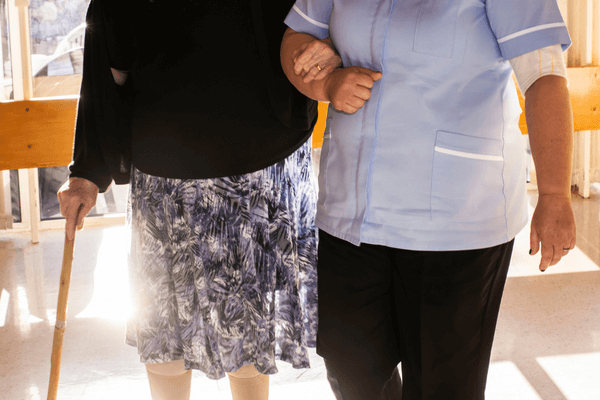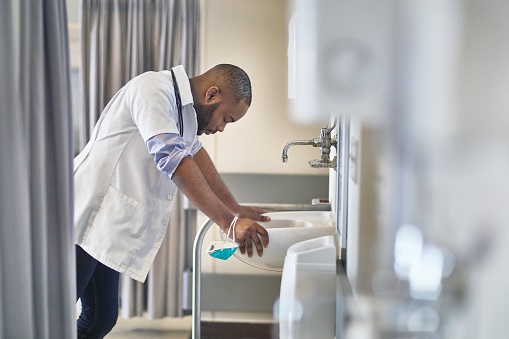The Health and Safety Executive (HSE) has identified failings, including in training, in relation to managing violence and aggression and musculo-skeletal disorders (MSDs) in the NHS.
 Britain’s health and safety watchdog carried out a targeted inspection programme on NHS trusts and boards between 2018 and 2022 to assess the management of risks from violence and aggression and MSDs.
Britain’s health and safety watchdog carried out a targeted inspection programme on NHS trusts and boards between 2018 and 2022 to assess the management of risks from violence and aggression and MSDs.
They have now set out their key findings in a report. It identifies management failings in 4 broad areas. These are:
- Risk assessment
- Training
- Roles and responsibilities
- Monitoring and review
Although HSE inspectors found that NHS employers had relevant policies and procedures in place, they were often not monitored or reviewed to ensure that they worked in practice or remained effective.
NHS trusts must manage risks of violence and MSDs
 The watchdog has now shared its findings with NHS Chief Executives of NHS Boards and trusts across Great Britain, NHS stakeholder groups and NHS unions.
The watchdog has now shared its findings with NHS Chief Executives of NHS Boards and trusts across Great Britain, NHS stakeholder groups and NHS unions.
Some inspections identified breaches of the law and enforcement action was taken where relevant, including the issuing of Improvement Notices.
The HSE is now planning further inspections within the NHS over the next 12 months to review the key areas identified for improvement within the report.
The Head of Health and Social Care Services Sector at the HSE, John Crookes, explained that those working within the healthcare sector can be at increased risk from violence and aggression and MSDs, due to the nature of their working activities.
He said:
“We hope all NHS trusts and boards will take note of our findings and review their operations to check these risks are being managed effectively.”
Managing the risk of violence in the NHS
 The HSE recently refreshed their guidance on managing violence and aggression at work after reported incidents of work-related violence and aggression were found to have increased in recent years – numbering 688,000 in 2019-20.
The HSE recently refreshed their guidance on managing violence and aggression at work after reported incidents of work-related violence and aggression were found to have increased in recent years – numbering 688,000 in 2019-20.
The updated guidance covers which pieces of legislation relate to violence and aggression at work, how to assess the risks, suitable control measures and reporting on – and learning from – incidents. It includes practical guidance for preventing work-related violence within different industries, such as social care, education, retail and transport.
The watchdog also identifies training as a key control measure to prevent and manage violence and aggression at work.
The HSE says that training “can provide workers with appropriate skills to reduce or diffuse potential incidents,” and that it should be available to everyone who may be at risk, including cleaners and maintenance workers and temporary or agency staff.
Workers should be trained at a level which is appropriate to the needs of their work activities.
The watchdog says basic training about managing violence and aggression could include:
- Identifying underlying and immediate causes
- Understanding that violence and aggression should not simply be accepted as part of the job
- Recognising warning signs, such as body language
- Relevant interpersonal skills, such as verbal and non-verbal communication skills
- Details of working practices and suitable control measures
- Procedures for reporting incidents
Where workers face a significant risk of physical violence at work, they may need additional training in skills such as physical intervention techniques.
Employers should ensure they are regularly holding refresher training to ensure workers’ skills remain up to date, and that they regularly review their training needs and evaluate training courses for effectiveness.
Managing MSDs in the NHS
 The HSE also provides key advice and guidance for managing musculo-skeletal disorders at work. Managing these risks is key for protecting workers from suffering from MSDs that are caused or made worse by their working activities.
The HSE also provides key advice and guidance for managing musculo-skeletal disorders at work. Managing these risks is key for protecting workers from suffering from MSDs that are caused or made worse by their working activities.
The HSE’s workplace health and safety statistics for 2021-22 show that 477,000 workers across all industries suffered from a work-related MSD, with 7.3 million working days lost as a result.
The majority of work-related MSDs affect the back (42%), with upper limbs and the neck also widely affected (37%).
Human health and social work had one of the highest rates of work-related MSDs of all industries. Human health and social work also reports the highest rate of work-related ill-health overall.
It is therefore vitally important that all workers in the health and social care sector are provided with effective manual handling and moving and handling of people training, along with adequate supervision and guidance.
Training solutions for managing violence and MSDs
First Response Training (FRT) is a leading national training provider delivering courses in subjects such as health and safety, first aid, fire safety, food safety, mental health, health and social care and more.
Their workplace health and safety training includes awards in Health and Safety, Conflict Resolution and Personal Safety, Managing and Assessing Risk, Manual Handling, Lone Working and Accident and Incident Investigation.
They have previously worked with organisations to develop bespoke training for them in subjects as such Hostile Situations, Conflict Resolution and Personal Safety and De-escalation and Breakaway Techniques.
FRT also provide specialist health and social care training courses, and have worked closely with a range of regional and national health and social care providers and NHS Trusts over two decades. Their training includes a range of courses in the field of Moving and Assisting People.
A trainer from FRT says:
“No one should have to endure violence or aggression while carrying out their working activities. It’s vitally important that employers assess and address the risks of work-related violence and aggression for their workforce and that they are able to respond appropriately and effectively if any incidents of violence and aggression do occur.
“Similarly, MSDs can be debilitating and impact people’s quality of life, as well as their mental health and wellbeing, and its vitally important that any worker who is required to carry out manual handling activities, or who has responsibility for moving and assisting people, is provided with relevant training which is updated regularly.”
For more information on the training that FRT can provide, please call them today on freephone 0800 310 2300 or send an e-mail to info@firstresponsetraining.com.
